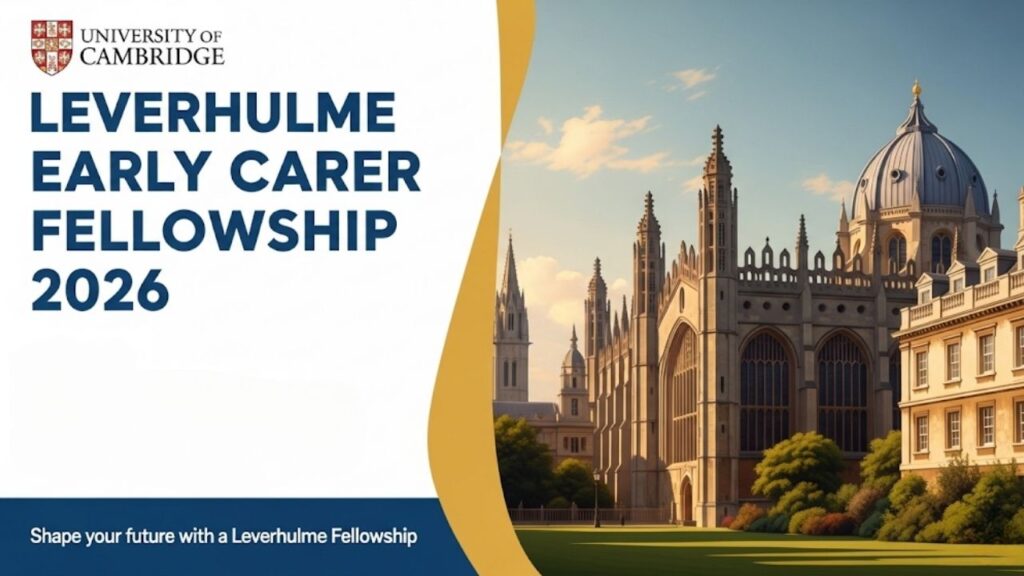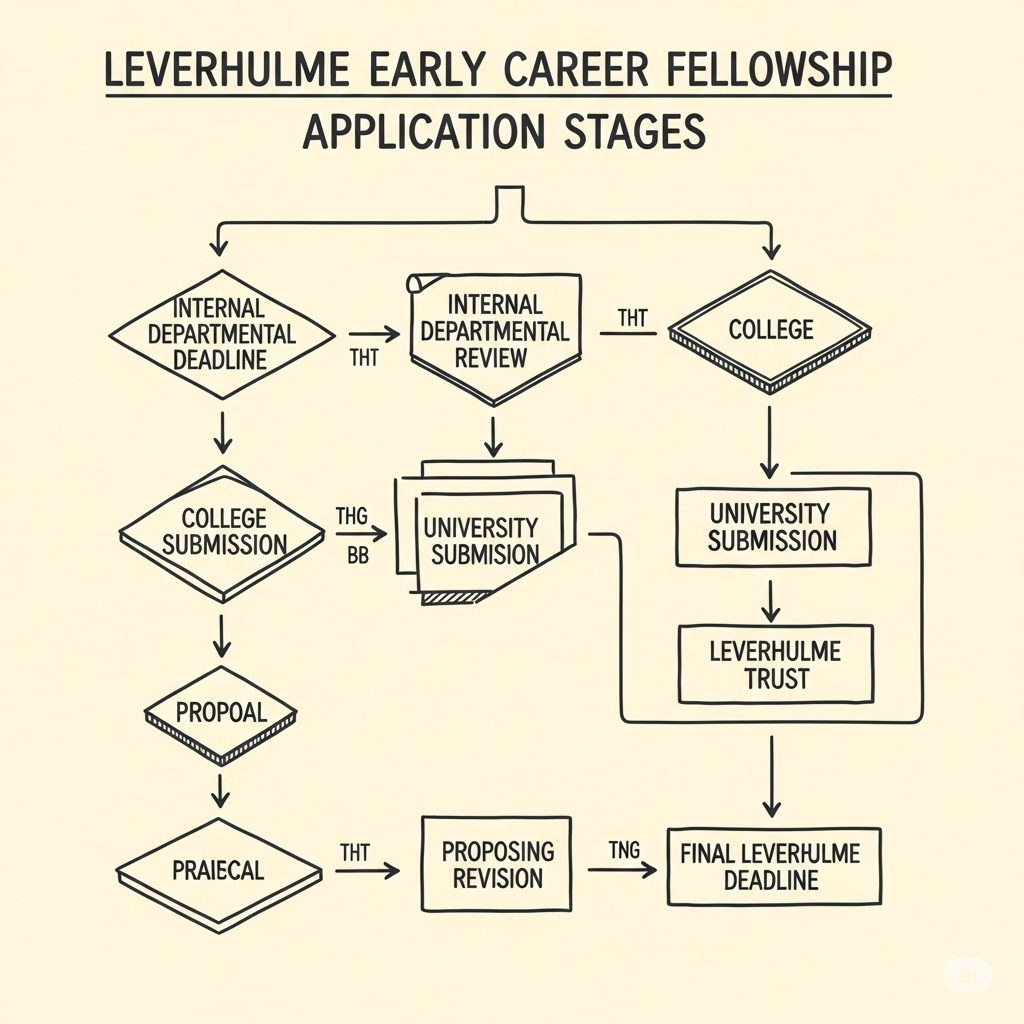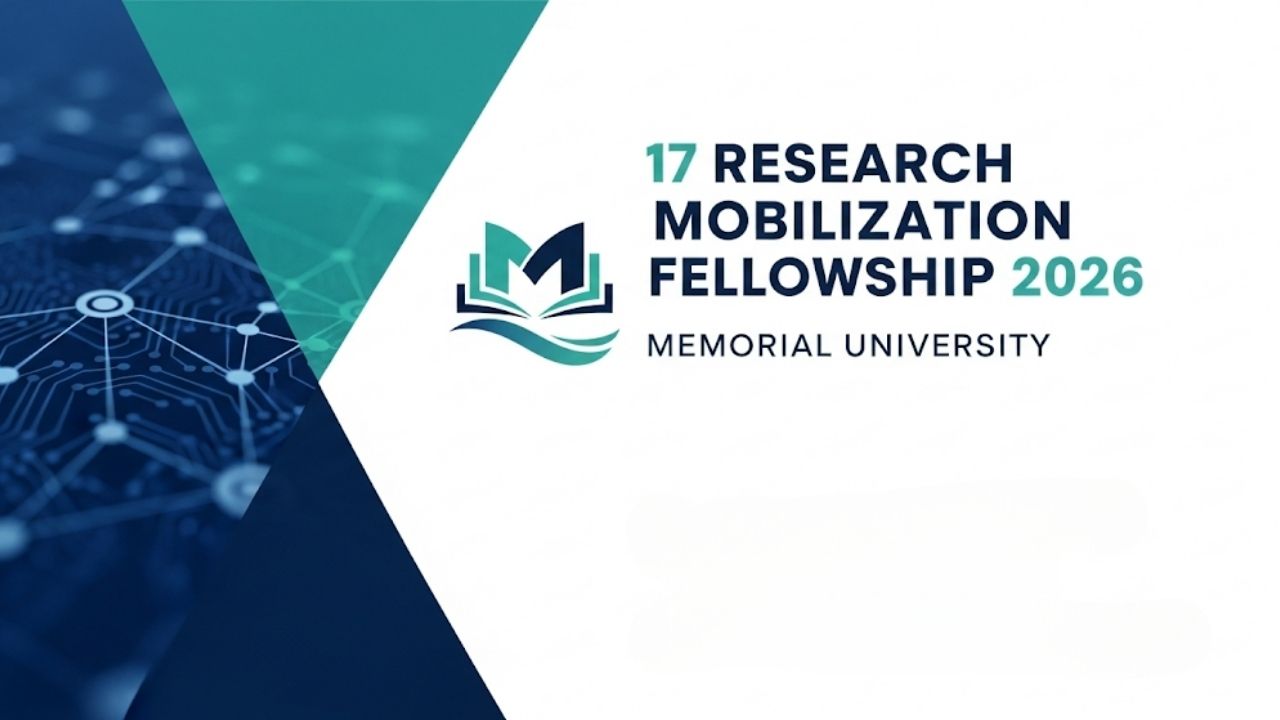Securing a postdoctoral research position is a significant milestone, and the Leverhulme Early Career Fellowship 2026 at University of Cambridge is one of the most prestigious opportunities available. It’s an award that not only provides the freedom to pursue a bold research project but also signals to the academic world that you are a scholar of exceptional promise. But the application process can seem daunting, a maze of internal deadlines, institutional requirements, and highly competitive selection panels. This guide is designed to cut through the confusion, offering a clear, actionable, and encouraging roadmap to help you craft a winning application and land this life-changing fellowship.

Understanding the Fellowship: More Than Just a Grant
The Leverhulme Trust’s Early Career Fellowships are a celebrated scheme aimed at providing career development opportunities for researchers who are at a relatively early stage of their academic careers. The Trust is deeply committed to supporting original and imaginative research. As an applicant, you must demonstrate not just a solid track record, but also a vision for a research project that pushes beyond the incremental, a project that is truly significant and publishable.
One of the most crucial aspects of this fellowship is the funding structure. While the Leverhulme Trust covers 100% of your salary for the first year (up to a maximum of £56,000), and 50% for years two and three (up to £28,000 annually), the University of Cambridge, through institutions like the Isaac Newton Trust, must secure the matching funds for the second and third years. This is why the process at Cambridge involves an internal pre-selection competition—it’s the university’s way of identifying the strongest candidates to put forward for national consideration. In my experience advising students, a common hurdle is not fully grasping this two-stage process. You aren’t just applying to the Leverhulme Trust; you’re first applying to Cambridge for the university’s endorsement and matched funding.
Navigating the Application Process: A Step-by-Step Guide
The key to a successful application is starting early and working collaboratively. The timeline for the Leverhulme Early Career Fellowship 2026 at University of Cambridge is a careful dance of departmental and institutional deadlines that precede the national submission.
Step 1: Finding Your Champion (The Mentor)
Your first and most important task is to find a suitable academic host and mentor within a Cambridge department. This person will be your guide, your advocate, and a crucial part of your application. Reach out to a professor or senior researcher whose work aligns with your proposed project. They should be someone you can work closely with and who is genuinely enthusiastic about your research idea. They will be required to write a statement of support, which can be the difference between a good application and a great one.
- Tip: Don’t be shy about contacting potential mentors. Briefly introduce yourself, your research background, and your proposed project. Attach your CV to give them a clear picture of your qualifications.
Step 2: Crafting Your Internal Expression of Interest
Once you have a mentor on board, you’ll need to prepare the materials for Cambridge’s internal selection process. The specific requirements can vary by department, but they generally include:
- A Research Proposal: This is the heart of your application. It should be a clear, compelling, and concise statement of your proposed project. Detail your aims, objectives, methodology, and expected outcomes. The proposal must be original and not merely a re-working of your PhD thesis.
- Your CV: A concise academic CV (typically a maximum of two pages) that highlights your research track record, publications, and any awards or honours.
- A Statement of Support from Your Proposed Mentor: This is a critical component, confirming their willingness to host you and explaining why your project is a good fit for their department.
The internal deadlines for these materials are often in the autumn preceding the fellowship year (for 2026, this will likely be in late 2025). Pay close attention to the specific deadlines for your chosen faculty or department, as they can differ significantly.
Step 3: The Isaac Newton Trust & Internal Selection
After the departmental submission, a selection panel will review all the expressions of interest. If you are successful, your application will be put forward to the Isaac Newton Trust, which provides the critical match-funding for years two and three of the fellowship. This is a highly competitive stage, as each faculty can only nominate a limited number of candidates.
I’ve seen many successful applicants focus on a project that not only demonstrates scholarly merit but also aligns strategically with the department’s research strengths. Think about how your work will contribute to the intellectual life of the faculty and the wider Cambridge community.
Step 4: The Final Application to the Leverhulme Trust
If you are selected by Cambridge and receive an offer of matched funding from the Isaac Newton Trust, you will then proceed with preparing the final application for the Leverhulme Trust. The Leverhulme Trust’s own application system will open in early 2026, with a final deadline typically in February. You will be asked to provide more detailed information, but the core of your application—your research proposal—will have already been vetted and refined through the Cambridge internal process.

Key Eligibility Criteria
Before you begin, it’s essential to confirm you meet the Leverhulme Trust’s strict eligibility criteria. For the Leverhulme Early Career Fellowship 2026, these include:
- PhD Submission: You must have submitted your doctoral thesis for viva voce examination no more than four years prior to the application closing date (19 February 2026).
- Career Breaks: If you’ve had a career break (e.g., for maternity leave, family commitments, or illness), you may still be eligible. Be sure to explain this in your application.
- UK Connection: You must either hold a degree from a UK higher education institution or have held an academic position in the UK for at least four months by the application deadline.
- No Permanent Posts: You must not have held a full-time, permanent academic post in a UK university or comparable institution.
Making Your Application Stand Out
Beyond meeting the technical requirements, what can you do to make your application truly shine?
- Clarity is King: The review panel will likely contain non-specialists. Your research proposal must be understandable and exciting to a broad academic audience. Avoid excessive jargon and explain complex ideas clearly.
- Focus on Originality: The Leverhulme Trust places a high value on originality. Your project should not just be an extension of your PhD but a new, ambitious, and independent research plan.
- Demonstrate Feasibility: While your project should be ambitious, it must also be realistic. A well-structured work plan, with clear milestones and publication goals, demonstrates that you have thought through the practicalities of your research.
- Articulate the “Why”: Why is this project important? Why now? And most importantly, why are you the best person to lead this research at Cambridge? Be sure to convey your passion and expertise.

Your Next Steps
Applying for the Leverhulme Early Career Fellowship 2026 at University of Cambridge is a challenging but deeply rewarding process. It’s a chance to take the next big step in your academic journey, with the backing of one of the world’s most prestigious universities and a leading funding body. Don’t be discouraged by the competition; instead, be motivated by the opportunity. Start your preparation now by identifying potential mentors and refining your research ideas. The future of your research career is within reach.
Your Ultimate Guide to the Nippon Foundation Fellowship 2026: Charting Your Course in Ocean Affairs
Your Definitive Guide to the Houghton Library Fellowship: How to Win a Coveted Spot at Harvard
FAQs
Q1:What is the specific application deadline for the Leverhulme Early Career Fellowship 2026?
The final deadline for the national Leverhulme Trust competition is 4pm on 19 February 2026. However, this is the deadline for your host institution (Cambridge) to submit the application on your behalf. The internal deadlines for departments at Cambridge are much earlier, often in the autumn of 2025. You must adhere to your chosen department’s internal deadline to be considered for matched funding from the Isaac Newton Trust.
Q2:Who is eligible to apply for the fellowship?
To be eligible for the Leverhulme Early Career Fellowship 2026, you must have submitted your PhD thesis for viva voce examination no more than four years prior to the national closing date (i.e., not before 19 February 2022), unless you have had a career break. You must also not have held a full-time, permanent academic post in a UK university. Additionally, you must either hold a UK degree or have been in continuous UK academic employment for at least four months prior to the application deadline. You can find the full, authoritative eligibility details on the official Leverhulme Trust website.
Q3:What is the role of the Isaac Newton Trust in the Cambridge application process?
The Leverhulme Trust’s scheme operates on a joint support model where the Trust provides a portion of the salary and the host institution must provide the rest. At the University of Cambridge, the Isaac Newton Trust is the body that provides this crucial matching salary funding for successful applicants for the second and third years of the fellowship. This is why Cambridge runs a highly competitive internal selection process—to identify the strongest candidates who will be put forward for the national competition with an offer of this matched funding.
Q4:What is the value of the fellowship?
The Leverhulme Early Career Fellowship provides three years of funding. For the 2026 round, as part of its centenary celebration, the Leverhulme Trust has announced that it will fully fund the first year of the fellowship (up to a salary of £56,000). For years two and three, the Trust will contribute 50% of the salary costs (up to a maximum of £28,000 annually), with the host institution (via the Isaac Newton Trust at Cambridge) providing the balance. The award also includes up to £6,000 per year in research expenses.










